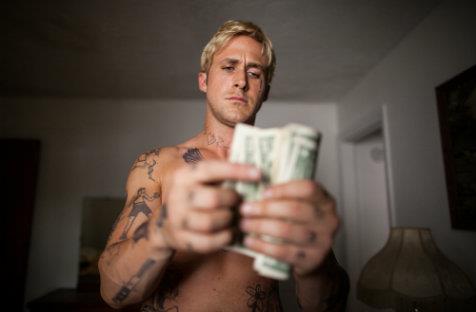In his 2010 debut, Blue Valentine, Derek Cianfrance exposed the fragility of romantic attachments, juxtaposing the carefree first flourishes of love with the disappointment that accompanies a relationship’s downfall. In his second film, The Place Beyond the Pines, the writer/director again unravels fraying emotional threads in contrasting strands, this time delving into the interwoven complexity of fathers and sons.
Telling a tale of four men, three parts, two generations and one location, The Place Beyond the Pines commences with the exploits of carnival circuit motorcycle stuntman Luke Glanton (Ryan Gosling, Gangster Squad). His itinerant lifestyle is challenged by the reappearance of former fling Romina (Eva Mendes, Holy Motors) and their infant son; determined to do the right thing, Luke vows to provide for the family he never knew he wanted – by any means possible.
Luke’s path intersects with Schenectady police officer Avery Cross (Bradley Cooper, Silver Linings Playbook) in harrowing circumstances, forever altering the mindset of the rookie cop. When overt praise begets institutionalised corruption, he endeavours to make a difference, but can’t escape his conscience. Fifteen years later, Avery’s past deeds resurface in the form of a schoolmate (Dane DeHaan, Lawless) of his teenage son (Emory Cohen, TV’s Smash).
As demonstrated in his devastating first film, Cianfrance crafts repetition into a rhythm: matching and mirroring important moments, echoing emotional beats, and ensuring that recurrences and coincidences are anchored in the narrative. While The Place Beyond the Pines may follow a linear structure, the reverberations between stories ensure not only interconnectivity but fluidity. Themes, aesthetics, musical cues and even the smallest plot details weave seemingly disparate elements into a riveting, resonant whole.
Accordingly, the film crafts an almost mythological rendering of its treatise on responsibility and repercussions, heightened by the dichotomy of its multi-faceted character study. A procession of alternatives – divided by legality, morality, economics and emotion – are presented, both neatly and messily, with parallels building in importance. The central, adversarial performances of the engaging, super-cool Gosling and reserved, honour-bound Cooper typify the divide and its immersive impact, as mimicked effectively by DeHaan and less so by Cohen.
While the cast – the sterling Gosling and DeHaan in particular – retain focus, Cianfrance’s strong sense of style assists in emboldening the involving tale, as does his narrative ambition. As distinctively shot by Sean Bobbitt (Shame) and frenetically edited by Jim Helton and Ron Patane (Blue Valentine), the feature rages with beauty and brutality; as co-written with Ben Coccio (The Beginner) and Darius Marder (Loot), it turns those traits into lingering sensations. The moody score by Mike Patton (The Solitude of Prime Numbers) provides the perfect complement.
The final product proves a detailed and delicate amalgam of ideas and intrigue, at all times both experimental and careful, yet it never fails to compel in its interpretation of inherited scars and sins. As satisfying as it is stylish, The Place Beyond the Pines is not only tense and tender, but intricately textured; as every crime epic should be.
Rating: 4 stars out of 5
The Place Beyond the Pines
Director: Derek Cianfrance
USA, 2012, 140 mins
Advanced screenings from 3 – 5 May
Release date: 9 May
Distributor: Roadshow
Rated: MA
Actors:
Director:
Format:
Country:
Release:





